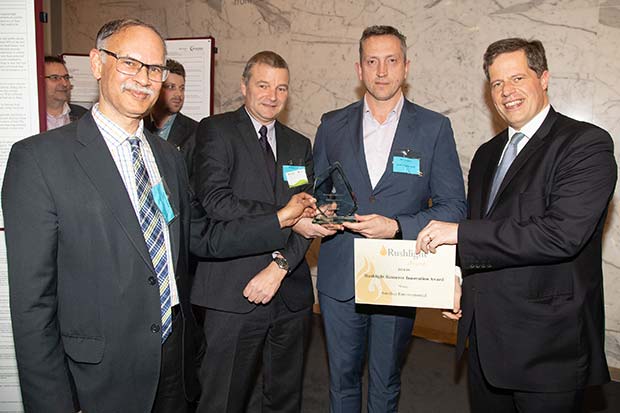Aurelius have won in not one but two categories at the ultra-prestigious Rushlight Awards, held in January at the Royal Society in London.

Very relative to the fork truck industry, The Awards are a celebration of innovative clean technology or ‘Cleantech’ for short. These include processes, services and products which reduce the negative impact on the environment by saving energy, reducing waste, cutting down the emission of greenhouse gases or promoting sustainability and the circular economy.
In partnership with Cambridge University, Aurelius won the Resource Innovation Award and Resource Recycling Award, both for the development of their clean battery recycling technology and the resultant superior lead product which is sold back to the battery manufacturers to produce more energy dense lead acid batteries. When the first industrial prototype plant is commissioned in a few months’ time the new process promises to change the way lead acid batteries are recycled forever.
The technology enables the processing of the spent paste in water (hydrometallurgy) rather than in fire (pyrometallurgy). This could help the incumbent recycling industry by reducing the carbon footprint by 80-89%, eliminating noxious gases (such as sulphur dioxide) at no added cost, cutting down on slag by more than 90%, and saving around 7,000 mWh per 10,000 tonnes of battery throughput.
In the meantime, Aurelius are already putting value back into battery recycling by offering a much better deal for scrap lead-acid batteries than the market does generally, as the consistent supply of end of life lead acid batteries is a key part of the process. This leads to a win-win situation for any business wanting to assist in this new green technology.
These markets include the Fork Truck, Uninterruptable Power Supply (UPS) and the Battery Service Industries for example, where Aurelius are fully licensed to collect Nationwide in varying quantities from these Industries.
In terms of the fork truck market, the company also offers a “one stop shop” approach to the recycling of old fork trucks and traction battery chargers which can make life a lot easier for some companies. They are also involved in the recycling of Lithium Ion and NiCad batteries.
Founded in 2014, the company’s name is a tribute to the Roman Emperor Marcus Aurelius. His strong moral values and ethical stance led to openness, honesty and justice for the people. Aurelius seeks to exemplify these principles in all its operations The company currently operates from two locations in the West Midlands and the scientific arm is run by Dr Athan Fox, based at Materials Science & Metallurgy Department at the University of Cambridge.
The recycling of lead batteries via current methods produces “smelter smoke” – a toxic mixture of sulphur dioxide, nitrogen dioxide and often lead particles. This is indeed ironic; the recycling of lead is motivated by our desire to sustain the world’s resources, and yet it damages the environment.
The lead-acid battery commands the largest segment of the battery market. It is used in over 1 billion petrol and diesel vehicles to start the engine and to power on-board electronics. Hybrid and electric vehicles also use these batteries to improve fuel efficiency and to reduce carbon emissions.
Standby power supplies are also dependent on the lead-acid battery. Indeed, most of the world’s fixed and mobile phone networks, IT infrastructure, hospitals, medical devices and more rely on these batteries for emergency power. They are even used in the renewable energy market to provide low-cost storage for the energy generated from solar and wind power.
The lead acid battery is the main application for lead, with 60-70% of the global lead consumption derived from the recycling of used batteries. On a global scale, consumption of lead exceeds 12 million tonnes per year – and growth rates are forecast to rise for decades to come, particularly in emerging markets.
The novel approach from Aurelius is based on a process invented by researchers at Cambridge University, has the capacity to transform lead recycling into a more profitable and environmentally friendly business.
The process uses refined mechanical separation and a patented hydrometallurgical process to afford a lead oxide battery paste unlike any other. The key benefits offered by our process and product are as follows: No harmful emissions.
Energy is a product of the reaction. Instead of only producing lead ingot, the process produces “batteryready” lead oxide.
Batteries made of the new material have shown to be 30-50% more energy dense, which leads to higher capacity for a given size of battery or it can be made smaller with the same capacity if space is critical.
It is anticipated that in the very near future, the way Lead Acid Batteries are manufactured and recycled will change forever for the best using the Aurelius processes.
Tel: 0121 369 9960
www.AEL.global




Comments are closed.